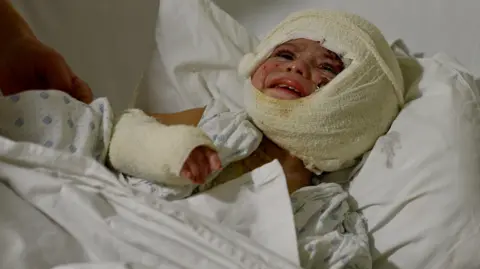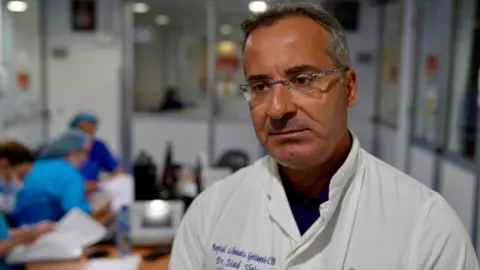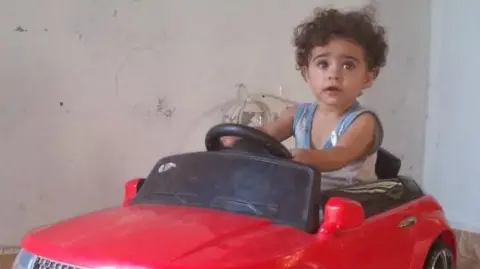 Goktay Koraltan/BBC
Goktay Koraltan/BBCThis story contains some distressing details
Ivana’s family was about to flee their home in southern Lebanon. An Israeli missile got there first. Now the two-year-old has third-degree burns on almost half her body. Her head and arms are encased in bandages.
Ivana looks lost lying a full-size bed in the burns unit of Geitaoui Hospital in Beirut. She is tiny and doll-like, but her cries are all too real. As she winces in pain, her father Mohammed Skayki fans her face, trying to distract her.
He recounts how his daughter’s skin and flesh was melted away.
It was noon, on 23 September – the day Israel began a massive bombardment of southern Lebanon, paving the way for its invasion a week later. There was no specific evacuation order for his area from the Israeli army, but the explosions were getting closer.
“We were ready to move, we had our stuff packed,” says Mohammed.
“The strike was close, around 10 metres from our house, right by the front door. The house shook. My daughters were playing on the balcony. I saw the little one – she was all black because of the missile dust. I carried her, something was exploding in the house and the ceiling was falling.”
In an instant the family was ripped from its roots in the town of Deir Qanoun En Nahr. “We left our house and only took the phones, and fifty dollars,” he says.
Rescuers rushed Ivana to hospital, with her older sister Rahaf. The seven-year-old’s injuries were less severe. She has already been discharged and is sheltering with relatives.
Mohammed shows me a photo of Ivana before the strike – her brown eyes open wide, a pink soother in her mouth, her face framed by brown curls. What’s left of her hair is now invisible beneath the bandages. Her scars may be with her for life.

But she is making a good recovery according to Dr Ziad Sleiman, one of two plastic surgeons on the unit.
And Ivana has brought some healing to the healers.
“She’s so kind. She’s so cute, so calm,” he says, smiling warmly. “Even when we change the dressings, she does not shout and cry. She is staring at everything around her. So, she sees everybody, and I think she knows everything. Really, she’s a special, special baby. She’s so brave, so strong.”
She is being closely monitored by the staff on the burns unit. It’s arranged in a circle – with nurses in the centre, so they can see directly into each of the eight rooms. There’s a queue of patients waiting for admission.
“Every day we are receiving phone calls to transfer patients,” says Dr Sleiman. “We cannot take everybody. We try to take the babies, the ladies, the heavily burned and traumatized patients, to give them the best chance to be treated.”
Most patients come with third-degree burns. For fourth-degree burns he says “you will see a black limb, like a piece of wood” and there is no treatment, only amputation.
 Goktay Koraltan/BBC
Goktay Koraltan/BBCLebanon’s health system is itself a casualty of war, under attack by Israel. The UN’s World Health Organisation has verified 23 attacks on health care in the past month, leading to 72 deaths.
The Lebanese health ministry has recorded “55 enemy attacks on hospitals and 201 on emergency medical technicians”. It says Israeli attacks on healthcare workers, facilities, and institutions are “a flagrant violation of International Humanitarian Law (IHL) and the Geneva Conventions.”
In recent days we reported from the scene of an Israeli air strike just across the road from Lebanon’s biggest public hospital, Rafik Hariri, in Beirut. A few residential buildings were flattened, and 18 people were killed, four of them children. No warning was given.
The Israeli Defense Forces told the BBC that they are “targeting Hezbollah, a terrorist organisation” which, they claim, “exploits ambulances and other medical infrastructure.” They deny targeting medical personnel.
So far, the more than 30 staff in the burns unit are still getting to work every day. None of them have been displaced, but there is a new normal in Beirut – traffic jams by day, bombs by night. That’s taking a toll.
“Honestly, it’s very hard to deal with patients having traumas and burns due to war,” says Dr Sleiman. “We do not have soldiers here; all the victims are civilians. We have ladies, we have girls, we have babies. It’s not their affair, their war. We, as doctors, must stay strong. But we have hearts. We have kids.”
Before leaving I asked Ivana’s father if he had anything to say to those responsible for maiming his little girl. He thought for an instant before replying in a measured and weary voice.
“I am not happy. A soldier for a soldier, not a civilian. These are children, a baby”, he said, referring to Ivana. “I am not happy but what can I do? I don’t want to be a murderer like them.”
 Family handout
Family handoutIvana has already had a skin graft – from her lower limbs – and is due to be discharged in about 10 days’ time. Her family are still displaced. They cannot return home to the south, which is under heavy Israeli bombardment.
Dr Sleiman fears there will be many more Ivanas.
He can’t see an end to the war. If it comes, he believes there will be no victory. For anyone.
“There’s no war that ends with a winner,” he says. “Every war ends with so many losers. Everybody will lose.”









